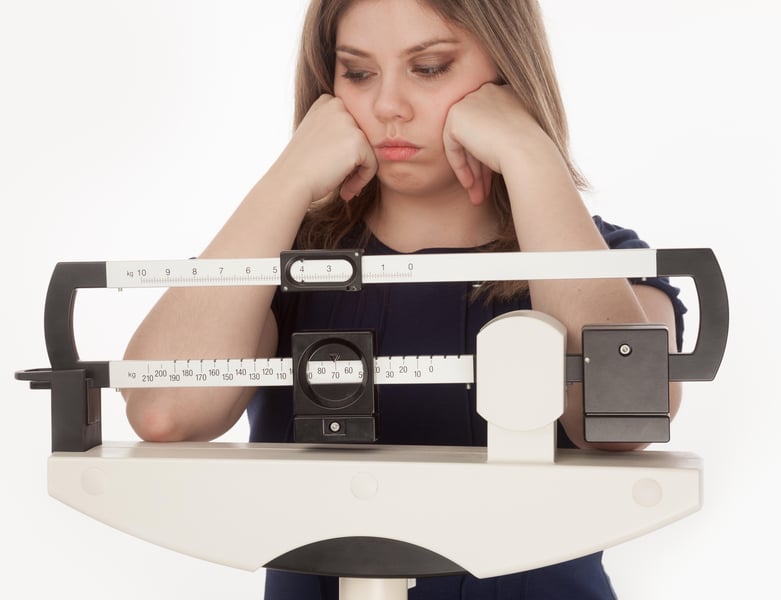Get Healthy!

- Posted January 6, 2023
Why Can't I Lose Weight?
You've cut back on your eating, started an exercise routine and just can't seem to lose weight. What's going on?
It could be a number of issues that are causing you to ask yourself, "Why can't I lose weight?" The good news is that you can work through them.
"It's very complicated, which is what people need to remember. It's not a simple task to say I'm going to lose weight and it happens,"said Connie Diekman, a nationally known food and nutrition consultant and former president of the Academy of Nutrition and Dietetics. "So, give yourself a break."
When it comes to eating, food choices, portion sizes and intent -- whether you're eating because you're hungry or in an attempt to fill an emotional need -- all play a role, Diekman said.
Of course, exercise has its place.
Not to be discounted is the significant role that biology and genetics play.
"Not everyone can achieve the weight loss they want to achieve. In other words, our bodies sometimes are smarter than we are,"Diekman said.
That doesn't mean that everyone can't achieve what is a healthy weight for them by understanding what they can control.
Typically, weight gain or loss is a calculation of energy intake and expenditure, but being overweight or obese is more complex, with genetics, behavior and environmental factors contributing, according to the National Library of Medicine.
Weight loss isn't a specific diet but a lifestyle of healthy eating patterns, regular activity and stress management, according to the U.S. Centers for Disease Control and Prevention.
Losing even a modest amount of weight, 5% to 10%, can improve blood pressure, blood cholesterol and blood sugar, according to the CDC.
Where to start with weight loss?
Eating
Balancing food to make sure that it's filling, nutritious and the right blend to stave off hunger is critical to weight loss.
A meal should have a balance of protein and carbohydrates, such as a tuna sandwich using whole grain bread and a side salad.
"The key is every time we fuel the body, choose a little bit of protein and a little bit of carbohydrate that keeps that blood sugar from becoming a rollercoaster. It keeps it more consistent so that hunger doesn't overwhelm us,"Diekman said.
Keep eating bread and butter, chocolate or a small portion of soda each day, if that's what you need to stick to a healthy eating plan, but swap out that extra sugar or calories from other parts of your day.
Exercising
Start by getting the recommended 150 minutes per week of moderate-intensity physical activity and two days per week of strength training, according to the CDC.
It probably needs to be higher than that to achieve weight loss, Diekman noted.
A feature on the AARP website suggests increasing strength training to stave off both age- and weight loss-related muscle loss. Vary the pace of a cardio workout with bursts of faster activity, such as walking with a quicker stride for a bit.
Awareness
Eating while watching TV, playing video games or scrolling through the internet can also trip people up, Diekman said.
Be in the moment, taking in the sight, scent and taste of your food.
Keeping a food journal can help you become more aware of what you're actually eating, she added.
Timing
When to eat a bigger meal or to stop eating continues to be a topic of debate.
A study published recently in the journal Cell Metabolism looked at whether it mattered for weight loss if people ate a large breakfast, medium-sized lunch and small dinner, or the inverse. It didn't. The big breakfast eaters did stay fuller through the day.
"Hunger is one of the main reasons that people fail to comply to a weight-loss or calorie-restricted diet," study author Alexandra Johnstone, from the University of Aberdeen in Scotland, said at the time. "So, if we have diet strategies that can help control hunger, then it would be beneficial in the real world."
The AARP suggests picking an earlier evening time to quit eating for the day, to prevent eating less healthy food at night when you're tired.
Sleep, plateaus and medications
Sleep can affect hunger and satiety hormones, Diekman said. Not getting enough sleep can make it harder to lose weight. At least five to six hours minimum a night are necessary.
Sometimes, a person who has been consistently losing weight will reach a "plateau,"where the weight stops coming off.
Reasons can include losing water weight at first, according to the Mayo Clinic. Muscle loss may also result in slowing metabolism.
Solutions can include increasing exercise and/or decreasing calories.
Some medications may also prevent weight loss, so talk to your doctor if you think that's happening to you, the AARP suggests.
"Bottom line: diets don't work. It is about finding the foods you like, in the right portions, distributed throughout the day, to keep you full and to enjoy what you're eating,"Diekman said.
SOURCE: Connie Diekman, food and nutrition consultant and former president, Academy of Nutrition and Dietetics
